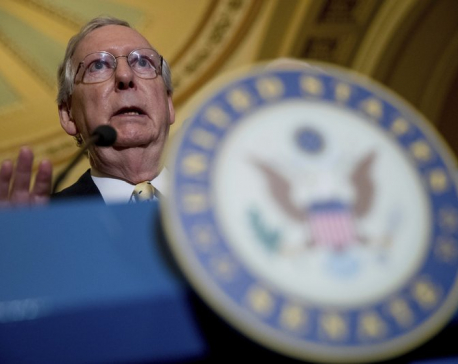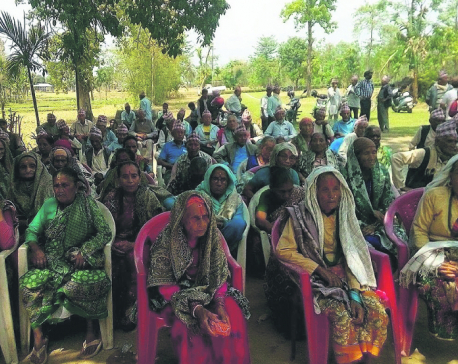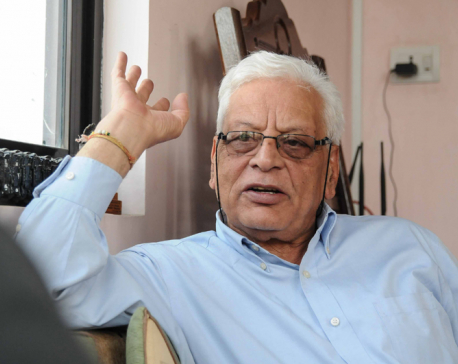
OR
Why parties are wooing Nepalis abroad?
Published On: November 17, 2017 07:23 AM NPT By: Roshan Sedhai
KATHMANDU, Nov 16 : They comprise nearly a third of Nepal’s population of eligible voters. But they cannot vote because they are working outside the country. However, this demographic has a potential of altering poll outcomes.
Though parties hardly paid any attention to an estimated 4 million Nepali migrants during the previous election campaigns, the scenario is different this time around. Realizing the influence they have on families and friends back home, political parties are making bigger investments to canvass support of an estimated 4 million Nepali migrants for the upcoming parliamentary and provincial elections.
From major parties including the UML and Nepali Congress to political startups like Bibeksheel Sajha Nepali Party have been reaching out to migrants through social media and by organizing various functions in those countries to win their support.
In order to woo overseas population, all parties have incorporated agendas of migrants’ rights and welfare in their election manifestos.
For example, NC, UML, Maoist Center, Naya Shakti Nepal and Bibeksheel Sajha Nepali have promised to create jobs at home in order to end the ‘vicious cycle’ of migration. Some of them have even pledged to do more to ensure safety and security of migrant population and their families.
Bibeksheel Sajha, which has been requesting migrants to tell their family members back home to vote for the fledgling party, has also made voting rights for migrants its key agenda item.
Though the Supreme Court has ordered the government to grant voting rights to migrant workers, the government has failed to do so citing technical difficulties.
Despite the fact that Nepal still denies them voting rights, migrants are constituent that parties cannot ignore given their sheer size and influence in the decision-making process back home.
With access to social media, migrants today are well connected with their family and friends back home and are closely engaged in decision-making.
“Migrants have huge influence on decision making in their families because they are the bread winners for most families,” said Ganesh Gurung, a sociologist and migration expert.
In the absence of proper studies, it is hard to tell how much influence migrants have on their family members’ voting decisions. Experts said such influence remains a possibility, especially if the migrant is politically aware.
The government does not have exact figures on the number of migrant workers abroad, but some estimates suggest there are around 4 million Nepalis abroad including in India.
Nearly 2.5 million Nepalis are believed to be working in Malaysia, Saudi Arabia, Qatar, United Arab Emirates, Kuwait, Bahrain, Oman and South Korea.
Political parties have long benefitted from Nepal’s migrant population. Parties like Nepali Congress, UML and CPN (Maoist Center) had relied on Nepali migrants for food, shelter and cash to wage struggle against the Rana oligarchy, party-less Panchayat system and the Maoist insurgency by giving donations or refuse to leaders.
Overseas chapters of political parties are still considered to be one of the biggest sources of income for political parties. All parties have overseas chapters in major countries like India, Gulf nations and Malaysia. Top leaders of parties ritually visit these countries to woo voters.
“Migrant populations have always remained an important support base for parties. But their influence on the election was limited as they would mostly remain cut off from families and party activities. It is no longer the case. Today, they are well updated on the events here and connected with families,” said Pampha Bhusal.
Although all parties have organization in major labor destination countries and top leaders regularly attend functions in those countries, UML seems better connected with migrants than other political parties. Gefont, a trade union affiliated to the UML, has thousands of members in the Gulf, Malaysia and India. Most of these members are regular ‘levy’ payers to the UML.
Social media and the internet have better connected migrants with activities back home and also given a platform to the political parties to access Nepalis overseas.
Social media, according to Ranjit Acharya, CEO of Prisma Advertising and a digital media expert, has been integral part of electioneering as young voters, who constitute a majority of voters, are mostly accessible on digital platform.
“Social media has definitely helped us reach out to migrants and young voters. But at the same time, we are also mobilizing our cadres on the grounds to garner support,” said UML spokesperson Yogesh Bhattarai.
You May Like This

5 reasons why health care bill would fail, 3 why it may not
WASHINGTON, July 24: There are many reasons why the Senate will probably reject Republicans’ crowning bill razing much of former President... Read More...

Parties wooing elderly voters
JHAPA, June 9: Seventy-eight-year-old Damber Timilsina seems very excited these days. The reason is that he believes he is likely to... Read More...

Even 744 are too many. Around 300 local units are viable in the long run
Shyam Krishna Bhurtel served as a member of Local Level Restructuring Commission and has worked as an expert in Nepal’s... Read More...







Just In
- NRB to provide collateral-free loans to foreign employment seekers
- NEB to publish Grade 12 results next week
- Body handover begins; Relatives remain dissatisfied with insurance, compensation amount
- NC defers its plan to join Koshi govt
- NRB to review microfinance loan interest rate
- 134 dead in floods and landslides since onset of monsoon this year
- Mahakali Irrigation Project sees only 22 percent physical progress in 18 years
- Singapore now holds world's most powerful passport; Nepal stays at 98th











Leave A Comment